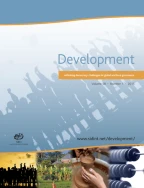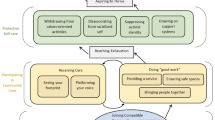
There is a momentum for self-care and well-being in feminist movements. Beyond neoliberal trends, we can find deeply politicized and inter-generational practices of care, and feminist ways of conceiving self-care and collective care, building sustainable and transformative organizations and movements, and comprehending what being well means in situations of injustice. In different corners on the world, feminists are developing provocative and creative models of care for survivors of violence, human rights defenders, activists, and organizations.
This is a preview of subscription content, log in via an institution to check access.
Price includes VAT (France)
Instant access to the full article PDF.
Rent this article via DeepDyve

The Concept Paper is a living document (http://bit.ly/2hSkmwu, accessed on 17 December 2016). I am grateful to all the members of the Wellbeing Advisory Group for the privilege to work aside you and learn from you. The Concept Paper and our time together have all enriched my mind, body and heart, and informed this piece, for which I of course bear sole responsibility.
Fearless collective is a ‘fearless network of artists and activists reclaiming public and digital space through art and participative storytelling’. Established following the Delhi Gang Rape in 2012, the collective ‘dreams to create a global movement of public art that is inclusive, collaborative, and replaces fear with trust, empathy, and curiosity.’ Read further and view their inspiring work online: http://fearlesscollective.org (accessed 16 December 2016).
This and other points came up during the Webinar on Self-Care and Collective Wellbeing co-hosted by AWID Forum’s Wellbeing Advisory Group, and the Black Feminisms Forum. Read the highlights here: https://www.awid.org/news-and-analysis/webinar-summary-self-care-and-collective-wellbeing (accessed on 16 December 2016).
For example, Peter Fleming, The way to a better work-life balance? Unions, not self-help, Guardian 11 October 2016 (https://www.theguardian.com/careers/2016/oct/11/way-to-better-work-life-balance-unions-not-self-help, accessed on 16 December 2016).
See for example an interview by Sarah Mirk with Evette Dionne, Audre Lorde thought of self-care as an ‘act of political warfare’ published on 18 February 2016 (https://bitchmedia.org/article/audre-lorde-thought-self-care-act-political-warfare, accessed on 16 December 2016).
CAPACITAR is an international network of practitioners teaching simple holistic wellness practices https://capacitar.org. Jin Shin Jyutsu physio-philosophy is an art of releasing tension and energypathways in the body https://www.jsjinc.net. TRE: Tension Stress Trauma Release is a series of exercises for releasing deep muscular patterns of stress https://traumaprevention.com/.
Webinar Summary: Self-Care and Collective Wellbeing, 3 November 2016. (https://www.awid.org/news-and-analysis/webinar-summary-self-care-and-collective-wellbeing, accessed on 19 December 2016).
Ahmed, Sara. Selfcare as Warfare, feministkilljoys blog, published on 25 August 2014 (https://feministkilljoys.com/2014/08/25/selfcare-as-warfare/, accessed on 16 December 2016).
Keely Tongate, Women’s survival strategies in Chechnya: from self-care to caring for each other. openDemocracy, 29 August 2013 (https://www.opendemocracy.net/transformation/keely-tongate/women%E2%80%99s-survival-strategies-in-chechnya-from-self-care-to-caring-for-ea, accessed on 16 December 2016).
http://airforafrica.org/, accessed on 19 December 2016.